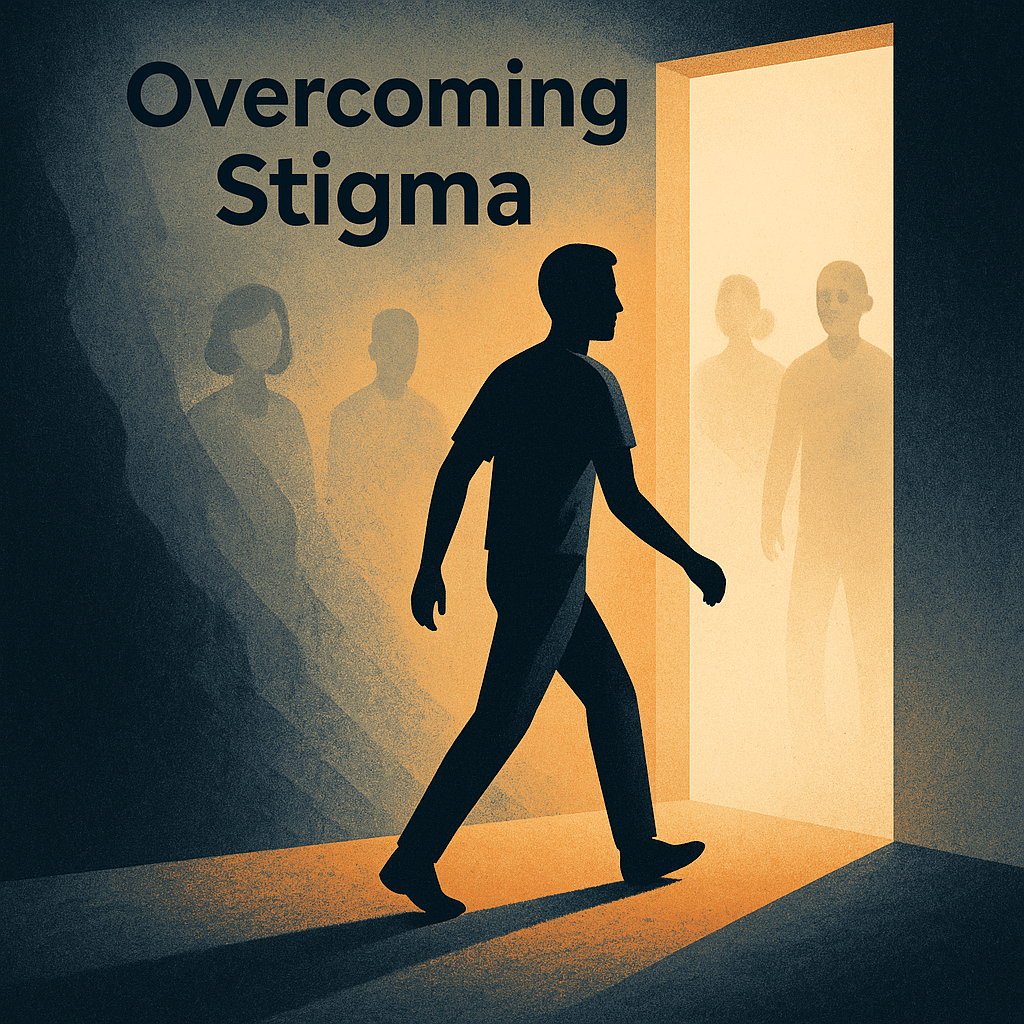You sit in the car outside the clinic. Ten minutes pass. The engine hums, hands grip the steering wheel, but the door never opens. Not because you don’t want help. Not because you don’t believe treatment works. It is fear. Fear of what people will say if they notice.
That moment isn’t rare. Countless people know they need help, yet they stall. It isn’t only the depression or the anxiety weighing them down. It’s the shame tied to it, the mental health stigma that insists, “Stay quiet.”
That’s why stigma in mental health feels so strong. Still, even heavy walls can crack, and this one can, too.
The Many Faces of Stigma
Stigma wears different masks. Sometimes it’s loud and obvious, other times it’s subtle, a side glance or a dismissive word.
Outdated Beliefs
We’ve all heard it. The casual advice: “Just think positively.” Or worse: “You’re overreacting.”
These ideas stick, even though science has proven otherwise. A 2010–2024 review pulled together 39 studies spanning more than a decade. The review concluded that stigma delays treatment, lowers adherence, and worsens outcomes. For people with psychotic disorders, those dealing with stigma were nearly twice as likely to experience poor results.
Cultural and Societal Pressure
Different communities feel stigma in different ways. In some, reputation carries more weight than health. A recent survey by the Kaiser Family Foundation asked U.S. teens why they avoided therapy. Cost and access were some of the responses. However, right up there was fear: fear of what others would think if they found out.
There’s also a twist called pluralistic ignorance. People assume their peers are less supportive of seeking care than they are. Therefore, even when friends might be understanding, silence wins because everyone’s misreading the room.
Fear of Professional Judgment and Labels
Besides family and peers, fear extends to healthcare itself. In 2024, the World Health Organization pointed out something called diagnostic overshadowing. Once someone has a psychiatric label, their physical complaints can get brushed aside. For patients, that means the worry is about the illness as well as not being taken seriously.
The High Cost of Silence
Silence doesn’t keep people safe. It keeps them stuck.
A NAMI–Ipsos poll in 2024 surveyed over 2,000 U.S. workers. Barely more than half, 58%, said they felt comfortable talking about mental health at work. That leaves nearly half the workforce trying to cope in silence. And what happens then? Symptoms worsen, energy fades, and careers stall.
The damage goes beyond the office: partners describe tension building at home, parents lose patience with children, and sleep unravels.
Even physical health takes a blow. When someone skips depression treatment or avoids anxiety treatment, the fallout is emotional, physical, relational, and financial.
Progress and Perspective: Society Is Changing
Turn on the TV or scroll through social media, and you’ll see athletes, actors, and musicians openly discussing therapy and recovery. That kind of honesty chips away at stigma faster than a brochure ever could.
A 2025 meta-analysis looked at 97 randomized controlled trials with more than 43,000 young participants. Programs that used direct stories with real people sharing lived experience outperformed classroom-style education. Knowledge jumped, attitudes shifted, and even behavior improved in measurable ways.
The World Health Organization said much the same thing in 2024: Awareness campaigns are fine, but on their own, they fall short. What really moves the needle are programs co-led by people who’ve been there. It’s lived experience, not slogans, that makes the difference.
So yes, stigma still lingers, but society is moving. The conversation is changing. The idea that mental health is just health, nothing more, nothing less, is finally taking root.
How to Overcome Stigma
Knowing stigma exists is one thing. Breaking through it requires steps. Here are some of the most effective.
Education
Ignorance feeds stigma, while knowledge starves it. Researchers have studied the role of mental health literacy and found that it indirectly encourages help-seeking by increasing social support and lowering stigma. People who understand conditions more clearly are more likely to reach out.
Language Matters
Words carve paths. Saying “She is bipolar” defines someone by their diagnosis. Saying “She has bipolar disorder” recognizes the person first. That difference shapes how communities view those struggling, and it changes how people view themselves. Small shifts in language can lead to big shifts in culture.
Finding Community
Isolation is fuel for stigma. Support groups cut through it. Whether in-person or online, these groups normalize seeking care. They prove others are walking the same road. Hearing someone else say, “I’ve been there,” creates empathy in a way numbers never could.
Leading With Compassion
Internal stigma might be the hardest. People blame themselves for struggling. They convince themselves they should be able to cope alone. Self-kindness is the first antidote.
Something as simple as taking an anonymous screening test, like the PHQ-9 for depression, can validate what someone already suspects. It transforms vague fear into a clear next step.
Reframing helps, too. Going to a doctor for anxiety treatment is the same as getting blood pressure medication or managing asthma. It’s maintenance of health, nothing more dramatic, and nothing shameful.
Your Health Is Worth It
No one should feel ashamed of seeking help. If you’re searching for a mental health clinic near you, keep your focus on privacy, compassion, and proven care.
Qualities to look for:
- Confidential settings where your story stays yours.
- Providers who listen without judgment.
- Evidence-based care that meets you where you are.
At Zeam, we’ve built our approach on those principles. We offer same-day appointments when momentum matters and telepsychiatry for those who want support without leaving home. Our team is trained to deliver culturally responsive and trauma-informed care, so that trust isn’t an obstacle.
If you’ve ever typed “psychiatry near me” into a search bar and stopped short of booking, we understand. That pause doesn’t mean failure. It just means stigma still has a voice. But it doesn’t have to be the final word.
If you are in Sacramento, Folsom, or Roseville, we invite you to take that next step with us. Seeking help is not a weakness. It is a strength, it is healthy, and it is the beginning of a better tomorrow.
Key Takeaways
- Stigma delays treatment and worsens outcomes — A 2010–2024 review of 39 studies found stigma is directly linked to delayed care, lower adherence, and poorer results in psychiatric treatment. [1]
- Teens still avoid therapy due to stigma — A Kaiser Family Foundation survey revealed adolescents cite fear of judgment, alongside cost and access, as major reasons they avoid care. [2]
- Cultural and systemic stigma persist globally — The World Health Organization (WHO) highlighted that diagnostic overshadowing and discrimination continue to prevent fair treatment in mental health care. [3]
- Workplace stigma is common — A 2024 NAMI–Ipsos poll found only 58% of U.S. workers feel comfortable talking about mental health at work, leaving nearly half to cope in silence. [4]
- Lived experience programs outperform education alone — A 2025 meta-analysis of 97 RCTs (43,000+ participants) showed interventions that included real stories of recovery improved knowledge, attitudes, and behaviors more than classroom-style education. [5]
- Language changes perception — Research shows person-first language (“has depression” vs. “is depressed”) reduces stigma and improves community attitudes. [6]
- Support groups and peer networks normalize care — Community engagement and peer-led programs help reduce self-stigma and promote earlier treatment. [6]
- Internal stigma is as damaging as external stigma — Self-blame and shame can stop people from seeking care, but compassionate approaches, self-screening tools like the PHQ-9, and reframing mental health as routine care help break through. [6]
References
[1] Liu NH, et al. Global perspectives on stigma and mental health outcomes. PMC. 2024
[2] Kaiser Family Foundation. Recent Trends in Mental Health and Substance Use Concerns Among Adolescents. 2024
[3] WHO Europe. The overwhelming case for ending stigma and discrimination in mental health. 2024
[4] NAMI–Ipsos. Workplace Mental Health Poll. 2024
[5] Springer. Meta-analysis on stigma interventions using lived experience. 2025
[6] Shim RS, et al. Recent approaches to stigma reduction and language impact in psychiatry. PubMed. 2025




